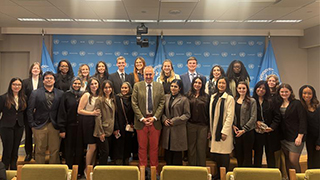Self-Paced Career Readiness Program to Launch in Spring 2026
Tuesday, November 18, 2025
 Seton Hall University’s Teaching, Learning, and Technology Center (TLTC) has partnered with the Career Center to launch a new self-paced modules program designed to help students build and demonstrate essential professional skills. Debuting
in Spring 2026, the program guides students through activities aligned with the National Association of Colleges and Employers’ (NACE) Career Readiness Competencies. Students who complete all modules will earn a Career Readiness Badge issued by the
Career Center, which they can add to LinkedIn profiles, résumés and portfolios to
highlight their preparation for internships and future career opportunities.
Seton Hall University’s Teaching, Learning, and Technology Center (TLTC) has partnered with the Career Center to launch a new self-paced modules program designed to help students build and demonstrate essential professional skills. Debuting
in Spring 2026, the program guides students through activities aligned with the National Association of Colleges and Employers’ (NACE) Career Readiness Competencies. Students who complete all modules will earn a Career Readiness Badge issued by the
Career Center, which they can add to LinkedIn profiles, résumés and portfolios to
highlight their preparation for internships and future career opportunities.
Benefits for Students
The program does more than strengthen core skills. It provides students with a clear and tangible way to showcase their accomplishments, enhancing their job applications and helping them present themselves confidently to potential employers.
Jorge E. Rivera, director of the Career Center, explained why this type of credential is valuable, stating, “Microcredentials and the Career Readiness Badge give students a real edge. They verify that a student has practiced and demonstrated key competencies such as communication, teamwork and technology skills, helping them stand out in a fast-changing job market.”
In practice, the program offers students several important advantages, it:
-
Provides: documented evidence of career-ready skills
-
Empowers: students to take ownership of their professional development
-
Supports: access to internships, leadership roles and full-time positions
Grounding the badge in the NACE competencies gives students a structured way to articulate their skills and connect their classroom and co-curricular experiences to what employers look for in new hires.
Preparing Students for What Comes Next
The initiative took shape as Rivera explored new ways to strengthen the student experience and better prepare graduates for the demands of today’s workforce. "Everything aligned when I received a message from the IT Department about their growing capabilities. It showed that the University was ready for something like this and sparked the idea to move forward," he said. "Renee Cicchino was instrumental in getting the ball rolling, connecting the dots and bringing TLTC and the Career Center together to explore what this could look like for our students."
Renee M. Cicchino, director of instructional design at TLTC, helped turn that early idea into a collaborative effort by aligning resources, expertise and support across both offices. What began as a simple conversation quickly became a shared commitment to expand meaningful, skill-building opportunities for students across Seton Hall.
Rivera hopes the program will also strengthen relationships with employers and broaden access to experiential learning. "As students gather more microcredentials, they will be building a strong foundation of NACE Career Readiness Competencies, which will help them secure internships, leadership opportunities and full-time roles after graduation," he said.
The long-term goal is to make the microcredential program a signature strength of Seton Hall by integrating it more widely across academic programs and increasing the number of available badges. The initiative directly supports Inspiring Great Minds to Greater Purpose: Strategic Plan 2025–30, advancing Priority 1, which calls for transformational learning experiences, expanded access to career-focused resources and a more inclusive approach to student success. The program reinforces the University’s commitment to equipping students with the adaptability, critical thinking skills and decision-making abilities needed to thrive in a rapidly changing world and to serve as agents of positive change long after graduation.
Categories: Science and Technology






